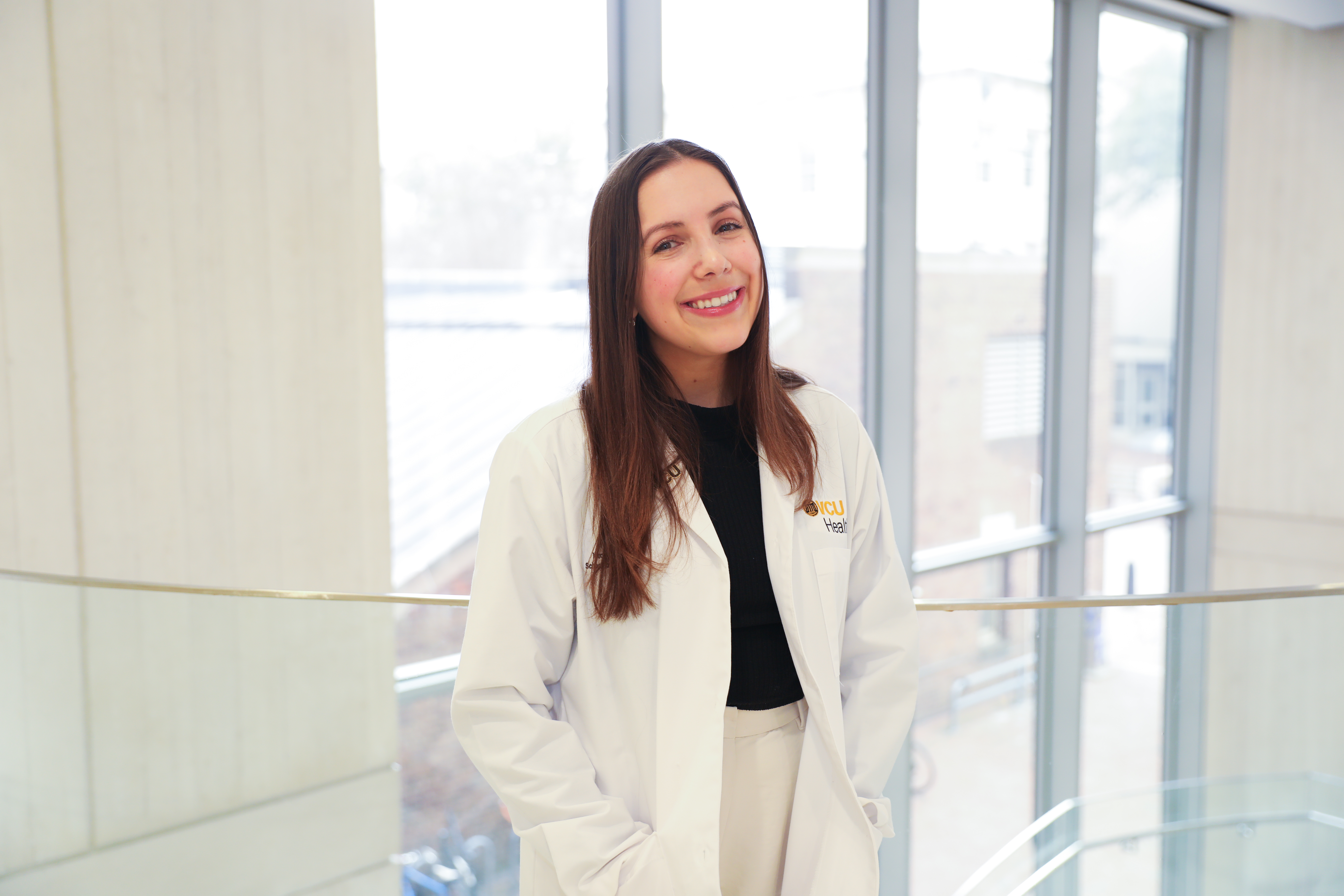‘Knowledge can be power’: Medical student’s research driven by childhood diagnosis
A gastroenterologist changed Nicole Lulkin’s life, and now she wants to contribute to the field through research and clinical care.

M2 Nicole Lulkin, who was diagnosed with Crohn's disease at age 13, got involved with gastroenterology research shortly after beginning medical school. (Photo by Arda Athman)
When Nicole Lulkin was in sixth grade, she started experiencing gastrointestinal pain and other symptoms that kept her home from school for weeks at a time. For nearly three years, as she and her family sought out answers, she felt disconnected from her body and isolated from her community. Finally, at age 13, receiving the diagnosis of Crohn’s disease — a chronic condition causing inflammation of the digestive tract — gave her a path forward and a drive to learn everything she can about the disorder.
Now, more than a decade later, Lulkin rarely has Crohn’s flare-ups. She started pursuing gastrointestinal (GI) research during her first year of medical school and is one of 14 students at VCU School of Medicine whose abstract qualified for the American Medical Association’s (AMA) annual Research Challenge Poster Symposium last fall. The project, which examined the association between long COVID and gastrointestinal (GI) disorders, is one of many in her growing research portfolio.
Drawing on her own experiences as a patient, and with the support of faculty mentors, Lulkin strives to give back to the medical specialty that changed her life through both research and clinical care.
“By learning more about it, it wasn’t this scary, totally abnormal thing anymore, and it showed me that knowledge can be power,” she said of her disease. “When I got to VCU, I knew I wanted to explore gastroenterology and not just learn about it but also contribute to the growing knowledge of it.”
A labor of love
When Lulkin arrived at VCU School of Medicine in 2023, one of her top priorities outside of class was identifying avenues for research. She approached Thomas Chelimsky, M.D., the faculty leader of her preclinical small group, for advice on finding a mentor in GI research. He immediately suggested she meet the chief of pediatric gastroenterology at the Children’s Hospital of Richmond at VCU — his wife, Gisela Chelimsky, M.D.
Lulkin jumped at the opportunity, and has since worked with her on several GI-related research projects.
For Chelimsky, who joined the School of Medicine faculty in 2022 along with her husband, working with students like Lulkin is one of the highlights of a career in academic medicine. As one of nearly 1,000 students in her own medical school class in Argentina during the 1980s, she said she “barely knew the professors,” and didn’t have access to the same kind of mentorship opportunities that students have at VCU. Now, she’s always eager to take students under her wing.
“It really energizes you when somebody loves what they’re doing, and Nicole clearly loves gastroenterology,” Chelimsky said. “She is so hungry to try new things, so full of energy, and she fights for people who are less privileged. It is just wonderful to work with her.”
Connecting the dots
Chelimsky has brought Lulkin onto several projects, together, including the one that Lulkin submitted to the AMA’s competition last year. Through a quantitative analysis of de-identified patient records in the global health data network TriNetX, they sought to identify associations between long COVID and GI disorders. They examined how many people developed a new GI disorder after having long COVID, how many people developed a new GI disorder after having COVID that seemed to resolve and whether having a previous GI disorder predisposed people to long COVID.
The results suggest that structural and functional upper GI disorders pose a higher risk for long COVID symptoms. Lulkin noted that the data doesn’t reveal any direct causation, but she hopes it opens doors to further exploration.
“It could be an interesting area of research to further look into treatment options targeting GI symptoms of patients with long COVID,” she said. “It also presents a new population of patients who have upper GI disorders that need to be followed more closely.”
Graded research is not part of the School of Medicine’s M.D. curriculum, but students are highly encouraged to seek out mentors if they’re interested in basic science, clinical or translational research. Lulkin spent time “pipetting and plating cells” in a wet lab as an undergrad at Emory University and knew when she started medical school that she wanted to take advantage of research opportunities. She enjoyed the hands-on science, she said, but after working with Chelimsky she finds the data analysis more intriguing and rewarding.
“I think I enjoy this type of research a lot more because we’re actually looking at patients, and each patient in this database has a story,” she said. “Research is an interesting way to personalize what we’re learning about in class and humanize these disorders.”
Lulkin and Chelimsky presented their findings at the 2024 World Congress of Pediatric Gastroenterology, Hepatology and Nutrition in Argentina, and plan to submit the paper for publication after the Step 1 exam in the spring. Starting clinical rotations later this year as an M3 will limit Lulkin’s availability for research, but she’s determined to continue to make time for it.
“As a patient with a gastrointestinal disorder myself, I feel as though I continuously am benefiting from current research progress,” she said. “I hope to make the same type of contributions.”
Interested in pediatric GI research?
Gisela Chelimsky, M.D., is currently accepting medical students and graduate students to participate in her ongoing studies. For more information about getting involved, contact her at gisela.chelimsky@vcuhealth.org.
Send us your stories!
The School of Medicine communications team is always looking to highlight student success, faculty achievement, cutting-edge research and innovative initiatives around the MCV Campus. If you have an idea for a story, please submit your pitch to laura.ingles@vcuhealth.org.